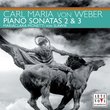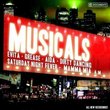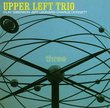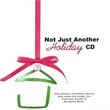| All Artists: George Rochberg, Christopher Lyndon-Gee, Saarbrucken Radio Symphony Orchestra Title: George Rochberg: Symphony No. 5; Black Sounds; Transcendental Variations Members Wishing: 0 Total Copies: 0 Label: Naxos American Original Release Date: 1/1/2003 Re-Release Date: 7/15/2003 Genre: Classical Styles: Ballets & Dances, Ballets, Symphonies Number of Discs: 1 SwapaCD Credits: 1 UPC: 636943911525 |
Search - George Rochberg, Christopher Lyndon-Gee, Saarbrucken Radio Symphony Orchestra :: George Rochberg: Symphony No. 5; Black Sounds; Transcendental Variations
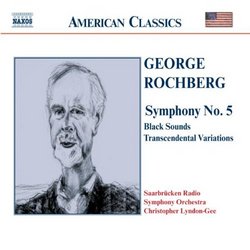 | George Rochberg, Christopher Lyndon-Gee, Saarbrucken Radio Symphony Orchestra George Rochberg: Symphony No. 5; Black Sounds; Transcendental Variations Genre: Classical
George Rochberg?s name enjoys a secure place in the canon of 20th century American composers, yet his large-scale, most challenging works remain little known. The power and sweep of Symphony No. 5 make a potent case for Ro... more » |
Larger Image |
CD DetailsSynopsis
Album Description George Rochberg?s name enjoys a secure place in the canon of 20th century American composers, yet his large-scale, most challenging works remain little known. The power and sweep of Symphony No. 5 make a potent case for Rochberg as one of the century?s truly great symphonists, blending a mature twelve-tone mastery with elegiac evocations that range across the span of human history and experience, while Transcendental Variations is one of the most searingly beautiful works ever conceived for the intimate medium of the string orchestra. Similar CDs
|
CD ReviewsA musical Walter Mitty Victor A. Grauer | 12/19/2004 (3 out of 5 stars) "I've reserved judgement on George Rochberg for many years. But after listening to his 5th Symphony a few times on this CD (the performance, by the way,is remarkably good, as far as I can tell without a score), I've made up my mind. The guy is basically a musical Walter Mitty. Or Snoopy. "Here's the great, ultra Romantic tormented genius, grappling with the major issues of life, death, transfiguration and like that, just hear how beautifully he can suffer -- and with the best of them." The trouble is, it's not Rochberg who is doing the grappling OR the suffering, it's some image he has in his mind of how Beethoven, Mahler, Schoenberg, etc. must have done it. And he wants to think he can do it too. What's remarkable about THIS Walter Mitty is that he almost CAN. The limited interest this CD has for me is in the almost purely technical fascination I get from hearing how convincing he can be, for a while, when he pulls out all those Mahler/Schoenberg stops (there's a dollop of VERY self-conscious Wagner in there too). He certainly has a very deep grasp of the complex language of late and post Romanticism, no question. But then I hear something simply lifted from some Mahler symphony (the 3rd I think), and later a passage that sounds a LOT like the 5 Pieces for Orchestra, or Erwartung, and then there's that really awful "lyrical" passage based on one of Wagner's favorite melodic moves and I am overwhelmed by the chutzpah of this guy and the utter banality and pretentiousness of his project. Another very revealing piece on this CD is "Black Sounds." To me this may be a key to understanding Rochberg because it is beginning to look very much as though his real gift is simply: mimicry. "Black Sounds" is a true embarrassment because its composer makes no pretense at all to any sort of originality but simply concocts, from bits and pieces of Varese (of all people), a kind of "essential" Varese piece. If I'd come across it on the radio without knowing who wrote it, it would have driven me crazy, because it is "definitely" by Varese. And yet it isn't actually any of the pieces he wrote. A kind of musical joke, I suppose. But I have the feeling Rochberg wants to be taken seriously. Sorry, I know he has many admirers, but for me Rochberg, despite his very apparent talent and even mastery, falls far short of the goal he's set for himself." Excellent Introduction to George Rochberg's Music!!!!!!!! Darin Tysdal | Bloomington, MN 55420 | 08/27/2003 (5 out of 5 stars) "George Rochberg must be mighty happy with Naxos, with two major releases of his music, and two recordings of the same piece (Black Sounds)! They are also well recorded and performed. When I first heard the 5th symphony I thought, "This reminds me a lot of the Tippett 4th Symphony (my favorite contemporary symphonic work). There are some similarities. Both were composed for the Chicago Symphony and Sir Georg Solti and both feature large orchestras, especially the brass. Both are in one movement subdivided into subsections with recaps of earlier material. Wheras the Tippett ends softly, the Rochberg 5th ends loudly. There is lots of Mahler in this work, and lots of emotion and heart. There is also melody. In my opinion, Rochberg isn't writing especially listener-friendly music, he is just writing as he feels. As in the Tippett, dissonance means strife and conflict, and tonality means the resolution of that strife. In his well-written notes for this recording, Christopher Lyndon-Gee tells how smitten with this work he became when he heard this work in rehearsal (he was up for the assistant conducting job for the CSO.)Black Sounds is the work that is duplicated between the two discs. This is affected by Varese, and is a work for winds and percussion which is in his "older", more dissonant style. It is brilliantly performed here. The Trancendental Variaions come as a complete shock. This is an arrangement of a movement of his 3rd String Quartet, and it is one that got Rochberg in hot water with his contemporaries for being "too tonal" or "too melodic". Now that we are used to works like the Gorecki 3rd Symphony, music like this takes on a special meaning. The only other comparison I can make is with Schoenberg's Verklarte Nacht. This work is truly a tonic for a troubled world, and it deserves all of the airplay and performances it can muster. Thanks to these Naxos recordings, George Rochberg is again proven as a potent force in American music today." Rochberg's Taut Passion Robin Friedman | Washington, D.C. United States | 08/13/2003 (5 out of 5 stars) "This is an outstanding CD. It consists of three orchestral works by the contemporary American composer, George Rochberg (b. 1916), including world premiere recordings of his Symphony No. 5 and his Transcendental Variations. The Saarbrucken Radio Symphony Orchestra conducted by Christopher Lyndon-Gee offer impassioned, convincing performances. Lyndon-Gee's liner notes for the CD are insightful and informative. The CD comes at a budget price as part of the Naxos "American Classics" series.But the overriding reason to hear this CD is Rochberg's music. During a long compositional career, Rochberg has used many styles ranging from atonality to traditional diatonic music. This disc has examples of several different combinations of tonal and atonal music. For all their stylistic differences, the music on this CD has a passionate, visceral appeal, combined with a discipline and tautness resulting from attention to musical form. Lyndon-Gee's liner notes aptly use the term "hard romanticism" to describe this music.The highlight of this CD is Rochberg's infrequently heard Symphony No. 5 (1984-1985) which is here recorded for the first time. This is a symphony of about 28 minutes which consists of a single movement. The symphony divides into 7 separate sections which Rochberg weaves together without pause. Sections of passionate, tumultuous, dissonant music alternate with three plaintive, reflective episodes. There is a hypnotic use of repetition and variation of simple musical phrases in this symphony. The work opens with a falling two-note figure which is repeated over and over again with increasing intensity to a chorus of brass. The symphony's orchestration is stunning. The work features effective use of solos, particularly for brass, for oboe and flute and for violin and cello. Percussion is used with great effect particularly in the development sections. There is an intriguing section with bells gonging behind solos for flute and oboe. The music is highly dramatic, and comes to full stops at several critical moments. The concluding, climactic section of the work features repetition of a swirling figure in the strings surrounded by brass. There is a rising cresendo in a string tremelo, which brings the work to a sudden dramatic end.The second work on the CD, "Black Sounds" (1965) also appears on a Naxos disc of Rochberg's music featuring the Boston Modern Orchestra Project conducted by Gil Rose. This work was written for the performance of a ballet on public television titled "The Act" which is about a murder. The music is ominous with march-like figures in a blaring brass choir to the incessant beating of the tympani. This is intense music with a feeling of the bizarre and a real sense of disorientation. The work progresses to a slow desolate section with the winds seemingly talking back and forth to one another. Then there is a return to beating tympani, squacking winds, and curdling brass as, apparently, the evil deed is done, concluding with a quiet fade-away. To me, the performance of the work on this CD shows greater intensity than does the performance by the Boston Modern Orchestra Project. But both performances are excellent and the music bears the two separate performances.The final work on the CD, Rochberg's "Transcendental Variations" (1975), derives, Lyndon-Gee tells us, from Rochberg's Third String Quartet (1971-1972). This is a work for string orchestra alone and it is in seven short movements. Unlike the other two works on the CD, this music is tonal and character. Lyndon-Gee describes this music as "ecstatic". The work is slow and reflective in character with long flowing lines in the strings. The orchestration varies from sections in which the high and low strings alternate with each other to sections in which they play in unison. The music has a tranquil, elevated character. Portions of it sound almost baroque -- a contemporary, highly sophisticated 20th century Pachbel's Canon. The second and fifth movements of this music consists of gracious, bittersweet dancelike themes, which extend with great delicacy even though each of the movements is only about two minutes in length. This music is indeed mystical, transcendental, and moving.Altogether this is a first-rate CD."
|

 Track Listings (9) - Disc #1
Track Listings (9) - Disc #1
